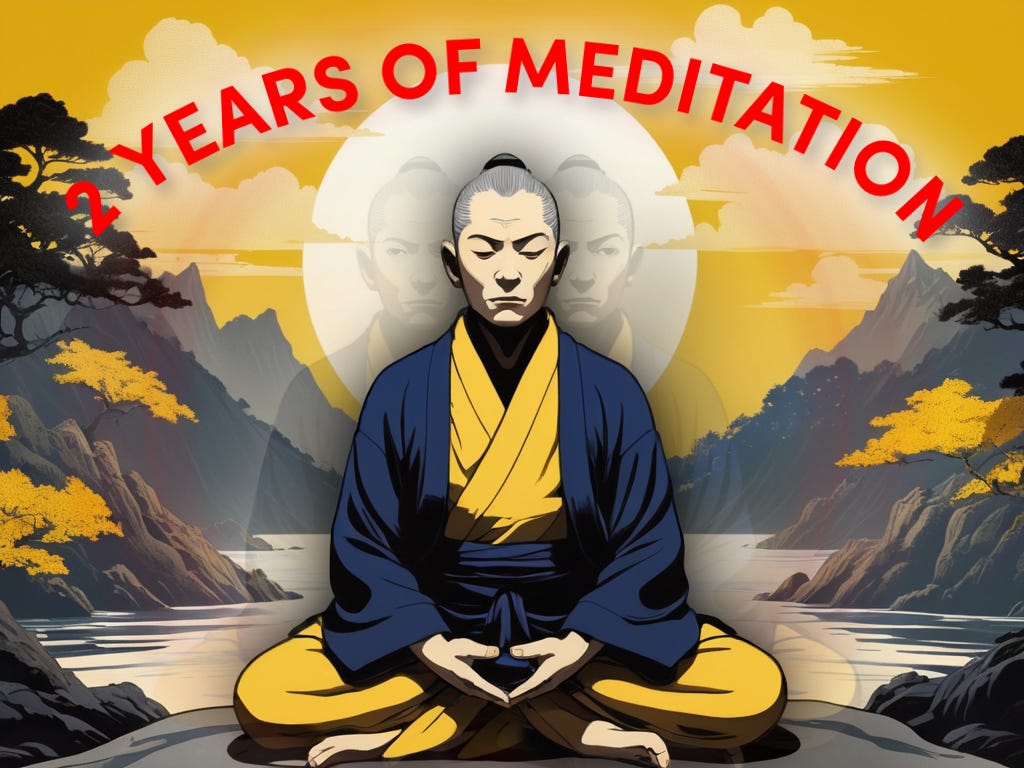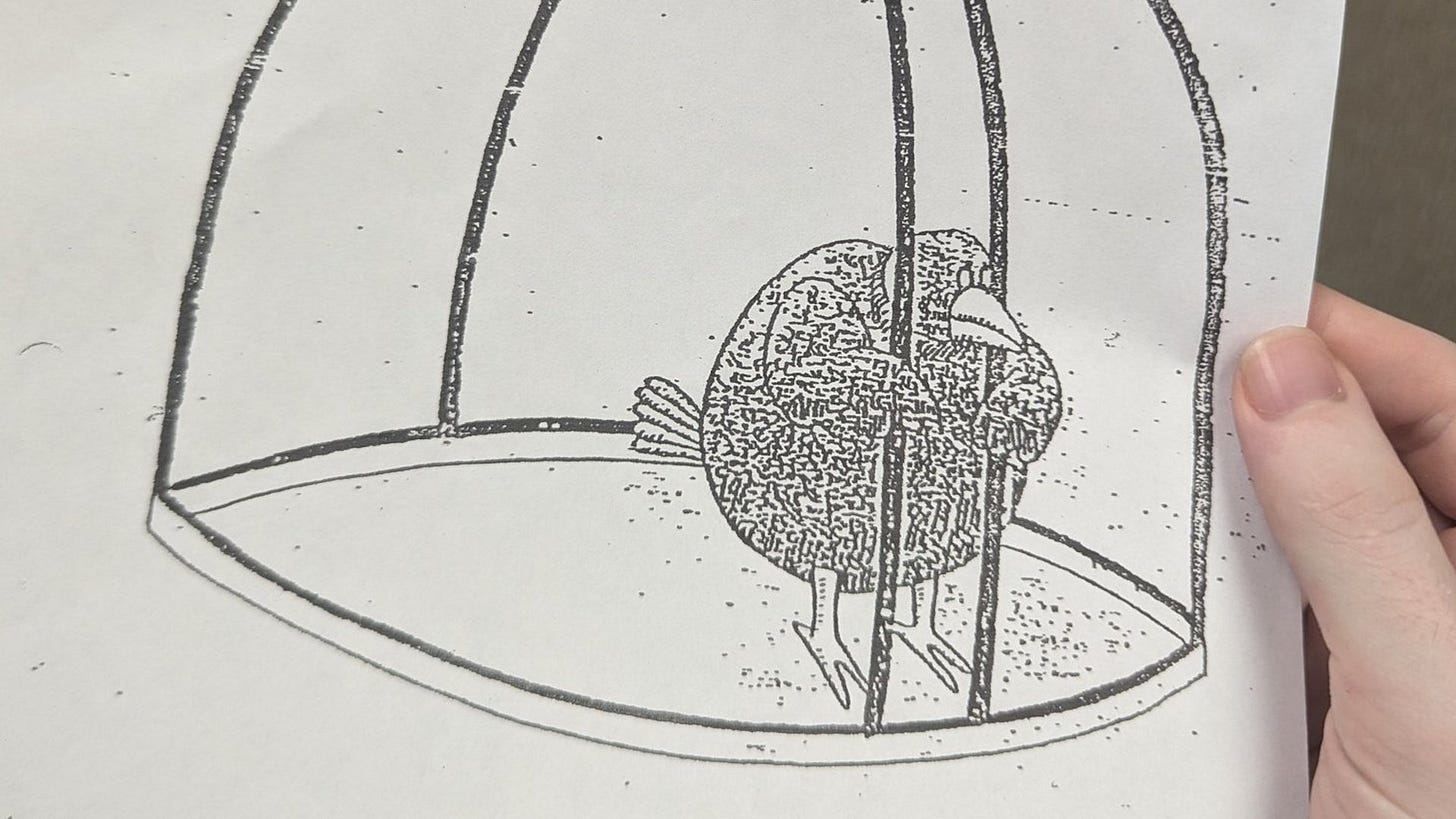My Experience After 2 Years Of Meditation
2 years of meditation: what it fixed, what it didn't fix, and whether it's a waste of time. • Premium Mind Bullet #13 (old format).
2 years of, more or less, frequent practice. What did it help and what did it not help with? Is it worth a shot? Do I consider myself a Buddha yet?
If you struggle with focus, anxiety, stress and brain fog meditation is a 0 cost simple tool that can help you with those problems. It’s also pretty cool and feels good to perform, makes life more bearable and peaceful.
What is meditation even about?
Quoting from my post:
First thing first, I want to clarify what I mean when I say meditation. It's nothing about metaphysics or spirituality. While some may perceive it that way, we are not interested in this. We are interested in scientifically proven technique that have a positive impact on your brain. If you had the image of some magic “wolololo” in your mind, get rid of it. Try to erase any preconceived notions of meditation from your mind and approach the following information with a fresh perspective, as if you're encountering it for the very first time.
How to start?
It's nothing complicated. Actually, there are not many things less complicated than this. Just get in a comfortable position and start… doing nothing. Don't think about… anything. It may feel strange and uncomfortable at first, especially if your brain is overstimulated on a daily basis, but trust me–it’s worth it. Also, set a timer so you know when to stop. And no, your phone isn’t muted, it’s just the time slowing down when you lay down and do nothing but focus on the present moment.
And that's basically it. Simple, right? It's about giving your mind some time to “recharge” and “clean the cache”, as I like to think about it.
Now that we have an understanding of the general concept, I will give you more specific instructions on how to begin.
As I said before, you can simply get comfortable, set a timer on your phone for a few minutes, and try to do the above. However, I highly recommend starting with the easier and more convenient option–the apps. As there are apps for everything nowadays, there are apps for meditation too. I started with “Waking Up” by Sam Harris, and that’s probably the best one out here. Sam will walk you through 10 minutes of daily meditation in a very relaxing way. Unfortunately, the app is based on a subscription model, so if you are like me and don’t want to spend about $20 every single month for an app, you may be interested in the one I currently use–Medito. It’s very easy to use, free, and does the job. Plus, it shows statistics, such as total time spent meditating, sessions listened to etc. Nice touch.
Now, pick a time in the day when nobody will interrupt you and make meditating your daily habit. Personally, I like to do it right before sleep, and I’m doing it almost every day (almost is being drunk or exhausted). Sometimes it may be hard to get yourself to do it (even for me and even now), but after I start, I always find myself surprised why I don't do it more often.
The best starting tip I can give, and it's worth trying not only with meditation but in other aspects of life as well, is to commit to the practice for 40 days. After this time, it will be just a part of the day, not a new challenge. Whenever you feel like “I don’t know man”, just keep practicing without overthinking it.
One more thing—when you begin, you might find yourself wondering if you're doing it right or if it should feel different. I felt the same way at first. Don't worry too much about it. Just focus on the process and try not to think about anything—it's truly that simple. If counting your breaths makes you more comfortable, go ahead and do that. Counting backwards from 100 is also very relaxing.
Having the basics out of the way, let’s dive deeper.
High-like state during practice
One thing I noticed, and I’m sure you will notice it too if you focus deep enough, is getting “into the zone.”
At the start, your mind will wander and search for anything to think about.
The initial phase is difficult and annoying. I'm not going to give you any fancy tips here. Meditation is not about exploits that give you 1% better performance, it's literally a practice of focus.
Your mind at the start is like a bucket full of holes through which focus will flow out. Remember that flex tape meme? Practice will work just like that, not that quickly though.
Your brain is like a highway—there are tons of vehicles running back and forth, a lot of them carry no value inside. Some vehicles just drive there for no reason, only increasing the traffic.
Meditation is the art of controlling this traffic and intentionally shutting it up.
When you are able to do that—that’s when the magic happens.
After keeping an undistracted laser-like focus for about 10 minutes you build a gate that is difficult for thoughts to go through.
That’s when you get into the zone.
I would describe this state as calming, relaxing, weird (probably the most accurate word here), pleasant but slightly uncomfortable.
The definition of inner peace can be stretched back and forth but this is what I would describe it, more about that later.
The most frequent recommendation is to focus on your breath. What I like to do is to stare into the blackness in front of closed eyes. It's not something you would ever pay attention to, but focusing carefully on it is a strange, sometimes uncomfortable (to the point you have to open your eyes), feeling.
I also like to pick a particular sensation in my body (itching, tension) and focus fully on that one thing.
Numbness in the long run
After regularly meditating for about 2 months for 10 minutes before sleep I noticed one important change—emotional numbness.
It means both being less touched by bad events in my life and less joy from good.
If you have a lot to process at the moment, no matter for what reason, clarity from meditation will help you.
It’s like growing deeper roots. Is it bad, or good? I guess it depends on how's your life going.
Don't worry though, you won't become as emotionally detached as Gregory House after 2 sessions. It takes time to see change. If it’s not a routine, it won’t work for you.
It's also important to note there that this is not a guaranteed effect. Meditation is a very personal experience. Don't create any preconceptions in your head just because I told you my experience. You will know how it influences you only after you try.
If you want to dive deeper into this, this phenomenon goes under the cool name of “a stone Buddha syndrome.” Don’t confuse with “stoned”.
Making it a useful tool for reducing stress
How I look at mediation is to use it as a tool—a natural first aid for dealing with stress you can use in any circumstance.
Meditating is fairly easy, but getting into the zone on cue is a skill, and to develop a skill you need practice.
So, practice:
On a bus.
In a line.
When you wait for the water to boil.
Try to quiet your brain right before sleep.
Focus on how your muscles feel during a workout.
Put on noise-canceling earbuds but don't play any music.
Focus on the sensation of water hitting your skin while taking a shower.
It's a great way to “reset” your brain after you bombard it with stimuli.
When thoughts will come (can’t avoid that) imagine a pair of scissors cutting off a ribbon and get back to practice.
What did it help and what did it not help with?
I heard quite a few stories of meditation transforming people’s lives. I can’t relate to that. For me, it’s nothing spiritual, it’s a tool.
It’s a good habit, it changes life for the better, but don’t expect it to make you go “Aha!” and turn your life around.
What did it help with?
Bringing you back to the present moment and reminding you that it’s all you have. More about that:
Regaining clarity in mental clutter: after a session, it's likely to get a similar satisfying feeling as you just cleaned up your room.
Focus: Not surprising. It’s easier to keep focus after doing nothing but focusing on something for 10 minutes. Don’t grab your phone right after though, do anything else.
Much calmness after a session.
Better coping with sadness and anger.
A habit of doing something daily is constructive just by itself.
Best ideas come to you when your mind isn’t constantly occupied.
Meditation has a scientifically proven positive influence on your brain, which I don’t mention here (but I want you to know) as it’s all about my personal experience. There are also tons of different kinds of meditation (described later).
This illustration, for me, is what meditation is supposed to help with:







